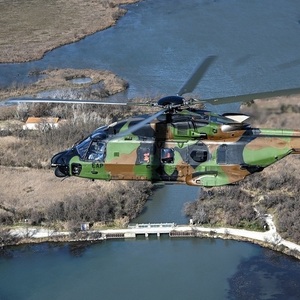NH90 helicopter flies on sustainable aviation fuel

February 14, 2023
BY Safran Helicopter Engines
With support from Safran Helicopter Engines, TotalEnergies, Airbus Helicopters, France’s defense procurement agency (Direction Générale de l’Armement-DGA) has carried out the first test flight of an NH90, during which one of its two RTM322 engines ran on Sustainable Aviation Fuel (SAF). This fuel was produced by TotalEnergies from used cooking oil using HEFA (Hydroprocessed Esters and Fatty Acids) technology and has a carbon footprint four times smaller than that of a fossil fuel. As such, it meets the European Union's 65% abatement requirement for sustainable fuels.
The test flight took place on Feb. 3, at the expertise and test centre DGA Essais en vol in Istres. It marks a first for a military helicopter with such a high content of SAF, and without any engine modification. The fuel meets the aviation industry's objective of accelerating decarbonization without making any modifications to the aircraft, engine or logistics infrastructure, known as a drop-in fuel.
In December 2022, a bench test at Safran Helicopter Engines' Bordes facility validated the use of this fuel on the RTM322.
Christian Caneilles, head of Heavy Helicopter Engines programs at Safran Helicopter Engines, said, "This is an important step in our roadmap for the large-scale deployment of SAF, which will kick-start a decarbonization process within the armed forces to gradually reduce the use of fossil fuels.”
Advertisement
SAF is one of initiatives from Safran Helicopter Engines aiming to reduce CO2 emissions from in-service engines. Its turbine range is already certified to run on 50% SAF.
Safran Helicopter Engines is working to certify operations with 100% SAF, while assessing any operational impact with its partners and customers. When a 100% incorporation level is achieved, SAF offers a potential reduction in CO2 emissions of 80%.
Advertisement
Related Stories
Effective April 1, Illinois’ biodiesel blend requirements have increased from B14 to B17. The increase was implemented via a bipartisan bill passed in 2022, according to the Iowa Soybean Association.
Airbus is taking a significant step toward scaling the adoption of sustainable aviation fuel (SAF) by testing a new “Book and Claim” approach. This initiative aims to boost both supply and demand for SAF worldwide.
Signature Aviation, the world’s largest network of private aviation terminals, has announced the expansion of its blended SAF offering at six new locations across Europe following multiple blended SAF supply agreements.
Virgin Australia has entered an agreement with Viva Energy to SAF for its flights departing from Proserpine, Queensland. The SAF will consist of Jet A1 and a 30-40% synthetic blend component made from waste and residue feedstocks.
The largest single volume order of sustainable aviation fuel (SAF) by a DB Schenker customer has been placed by Mercedes-Benz. The order is for approximately 13,000 metric tons of SAF and is expected to reduce CO2 emissions by 40,000 metric tons.
Upcoming Events










